New Delhi: Reversing a recommendation that saw middle-aged men in the US taking low-dose aspirin daily to prevent a heart attack or stroke, a medical task force that evaluated recent studies now says the risk of taking the blood-thinner possibly outweighs the benefits.
The US Preventive Services Task Force is an independent panel of experts that reviews the evidence of effectiveness and develops recommendations for disease prevention. Their recommendations have influence on medical practices in the US.
“Our message … is if you don’t have a history of heart attack and stroke, you shouldn’t be starting on aspirin just because you reach a certain age,” Chien-Wen Tseng, a member of the task force, told The Washington Post.
The change in the task force’s stand came after a review of scientific studies which shows that taking low-dose aspirin has very little benefit for people between the ages of 40 to 59 who are at risk of cardiovascular disease.
Who should and shouldn’t take it?
According to the task force’s draft recommendation, people who have a 10 per cent risk of developing a cardiovascular disease over the next ten years should make decisions about taking aspirin only in consultation with their health-care provider.
Moreover, those over the age of 60 have no benefit in taking aspirin as a preventive measure, if they have no history of heart disease or stroke.
Aspirin prevents clots from forming in the blood vessels, and can thus prevent stroke or cardiovascular events. But the blood thinner can also cause major bleeding.
The task force has not recommended any changes for people who have been prescribed after they had a heart attack or stroke.
According to Tseng, the task force’s proposed recommendations intends to ensure that people do not start taking aspirin without consulting their doctors.
The recommendations are now open for public comments, and is yet to be approved by the US government.
In 2016, the panel had recommended the use of low-dose aspirin to prevent colorectal cancer and cardiovascular disease in people aged between 50 to 59 who were at an increased risk of heart attack and stroke.
But now, the task force believes that the benefit of taking aspirin is smaller than what was thought before.
Meanwhile, for colorectal cancer, the evidence is still unclear about whether the aspirin can have preventive benefits. The panel has called for more research on the same.
(Edited by Paramita Ghosh)
Also read: Steroid use, diabetes among 5 reasons why India has 71% of world’s black fungus cases: Study
